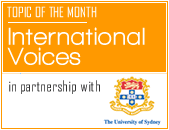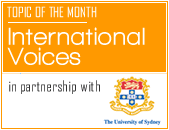China a Partner Australia Can’t Live Without
He Yun | September 16, 2009

After the arrest of Rio Tinto executive Stern Hu On June 2, and the visit of World Uyghur Congress leader Rabya Kadeer to Australia, Sino-Australian relations experienced an ice-age chill. China responded by cancelling the scheduled senior ministerial visit to Australia, leaving Prime Minister Kevin Rudd describing the bilateral relationship as “full of challenges.”
Fact is, right now, everything in Australia which has the remotest link to China is under attack.
The Sinophilic Prime Minister Kevin Rudd, with his connections to China, is especially vulnerable to such accusations. Rudd was attacked by the opposition leader Turnbull for going on sponsored trips to China; despite the fact that it is very common for politicians and celebrities to travel with expenses covered by either a third party or the recipient country.
Endless negative stories are run everyday questioning China’s real intention toward Australia’s resources with Barnaby Joyce declaring resentfully, ‘The Australian Government would never be allowed to buy a mine in China. So why would we allow the Chinese Government to buy and control a strategic asset in our country.’
From the Australian perspective, China’s economic growth can only be sustained with massive imports of Australian resources. The truth is, China is also a partner Australia can’t live without.
Even at the height of the China-Australia friction, Chinese banks and business continue to fund Australian companies.
Most recently, PetroChina signed a liquefied gas supply deal with Exxon that is worth $50 billion. Unsurprisingly, this is the single biggest export deal in Australian history. In 2006–07, mineral resource exports in Australia totaled $107.8 billion, or 77.4 per cent of Australia’s total commodity trade, while the PetroChina-Exxon LNG deal amounts to almost half of the total mineral export for two years.
 Meanwhile, China’s Yanzhou Coal Mining agreed to buy Felix Resources for $2.9 billion, and smaller Chinese steel mills agreed to provide $6 billion for the upstart Fortescue Metals Group in exchange for cheaper iron ore prices.
Meanwhile, China’s Yanzhou Coal Mining agreed to buy Felix Resources for $2.9 billion, and smaller Chinese steel mills agreed to provide $6 billion for the upstart Fortescue Metals Group in exchange for cheaper iron ore prices.What the mindlessly magnified media paranoia conveniently neglected is the fact that the pouring Chinese investment helped Australia to recover from a world economic crisis in which most of its European counterparts are still sucking deep. As many analysts pointed out, the Chinese market is especially important in a time of global economic crisis. Australia’s dominant mineral suppliers would have suffered bitterly in the big slump in global demand had Chinese investments not come to their rescue.
But the Chinese market is not only important for Australia’s mineral industry, which is the biggest contributor to Australian economy, but also the education sector, which is Australia’s third biggest industry. Every year hundreds of thousands of Chinese students come to study in Australia. According to an Australian Department of Education survey, in 2005 China contributed $1.8billion to Australia’s economy through students alone. This figure has grown considerably in recent years.
Australia needs China in other areas as well. For a long time Australia played an important role in Asia Pacific regional issues. It fought in World War II, and helped resolve the Malaya Emergency from 1950 to 1960. It also contributed a large amount of air power and infantry to secure the independence of Malaysia during the Indonesia-Malaysia confrontation. In recent years, Australia has been an important player in precipitating regional dialogues and defense talks.
However, as the Singaporean Prime Minister Lee Hsien Loongpoints out, "The regional security tone is not set by Australia – it’s set by relations between China and the United States." China is undoubtedly the most important player in this region. Australia needs to seek China’s support and cooperation if it wishes to push forward its own agenda.
Australia has a stake in the North Korean nuclear crisis. Northeast Asia is the most important market for Australia and South Korea has huge amount of Australian investments. It wants to see a peaceful, de-nuclearised peninsula so it can continue to invest in this region. To achieve that goal it will need China’s help.
Australia will also have to coordinate its standing with China in the Copenhagen climate change meeting in December as well as other environmental issues. In regional frameworks like ASEM and OPEC, China is, as always, a very important friend to have.
Australian politicians know these facts. Deputy opposition leader Julie Bishop told reporters "It is time for the prime minister to act to restore the relationship that he has so seriously damaged with China." She emphasised, "China is one of our most important trading partners and this deteriorating relationship will affect our national interest."
It’s perhaps time for the Prime Minister to voice up and see to a more reciprocal bilateral relationship.
He Yun is a graduate student at Tsinghua University’s School of International Relations in Beijing. She is currently a Visiting Research Fellow at the University of Sydney. She has previously worked with the BBC and written for China’s Global Times.
SHARE WITH:














daniel_tao
September 20, 2009 at 6:45 am
China: ATM — Australia takes cash from. Do you wanna lose it?
As to the education, record shows that more and more chinese students are choosing Australia as their overseas studying country because compared with Canada and other countries, Australia is easier to get Permanent Resident visa, which further could be qualified for applying for Australia citizenship. This trendency is also caused and affected by the local Chinese residents in Australia who the Chinese students can depend on and get advice from. This tendency still keeps strongly even the immigration policies have changed too much. However, who can imagine what this tendency would look like if the relationship between Cabarra and Beijing get exacerbated. In general, expenditure by international students among which 30% are from China, in Aus makes a very significant contribution to the economy. The tuition fees are only part of the big expenditure, which has already made education be the third industry of Australia.
In the iron ore field, China has discovered an iron ore deposit rich enough to impact on its import of Australian resources, according to a report in The Australian. The China News Agency also reported the discovery of the biggest iron ore deposit in Asia, situated in China’s northeast. The deposit would also be larger than BHP and Rio’s Pilbara reserves although the content in the ore is not as good as Australia’s. This could be an alternative for China to choose and if this did come true, Australia would be really losing its ATM.